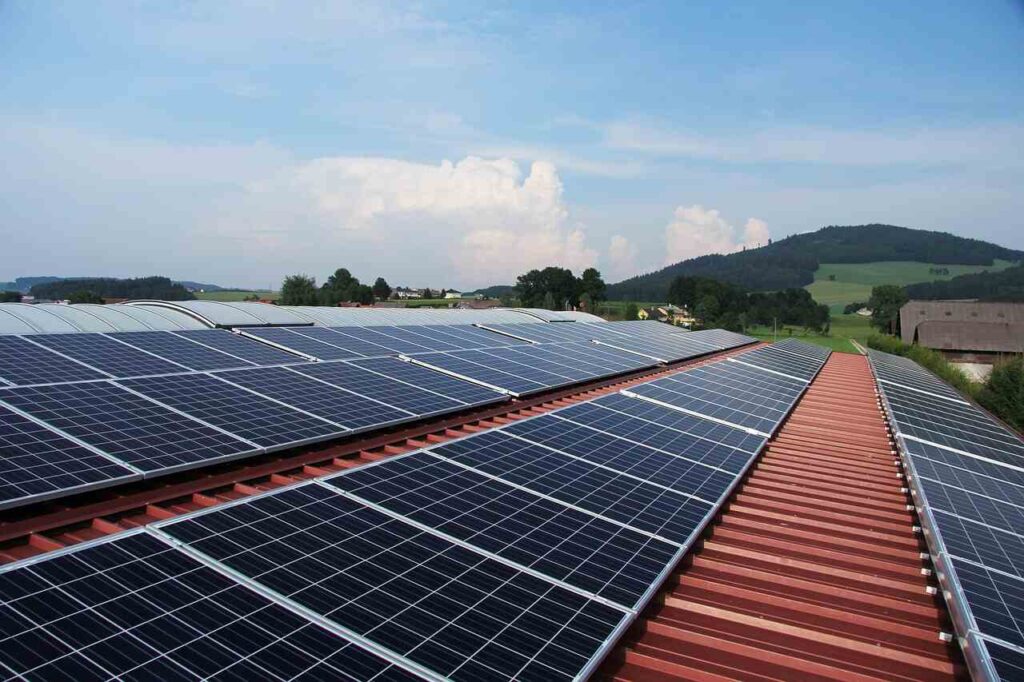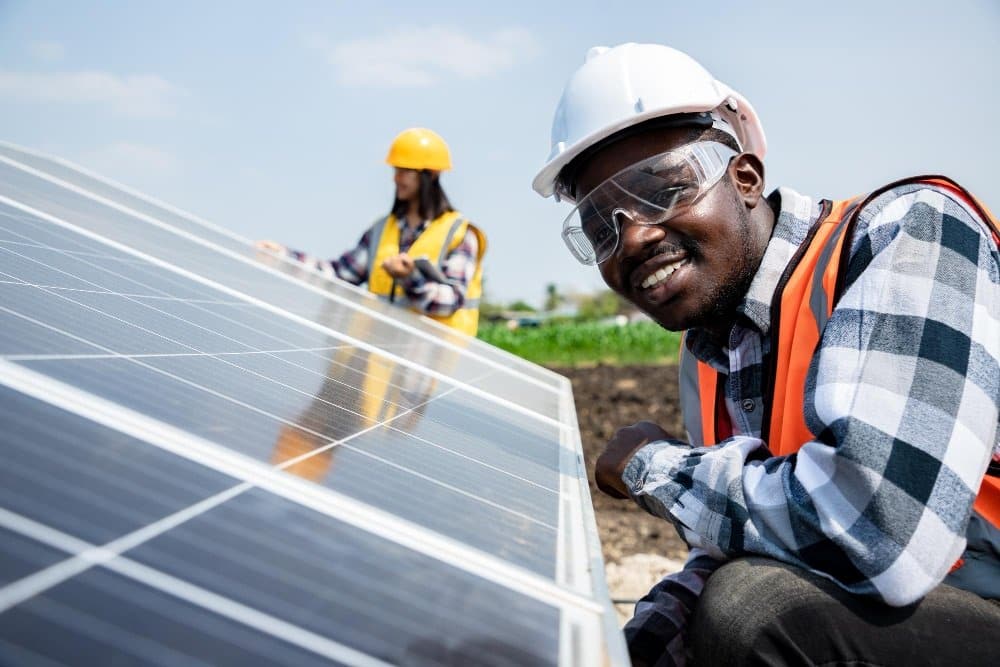Solar Energy for Businesses in Ghana: Boosting Efficiency and Savings
Solar energy for businesses in Ghana a sustainable and cost-effective energy solution. It helps reduce electricity bills and promotes environmental responsibility.
Ghana experiences abundant sunlight throughout the year, making it ideal for harnessing solar energy. Many businesses face high energy costs and frequent power outages. Solar energy systems provide a reliable and affordable alternative to traditional power sources. Installing solar panels can lead to significant savings on electricity bills over time.
Moreover, Solar energy businesses can benefit from adopting renewable energy solutions. Solar energy also contributes to reducing carbon footprints, aligning with global sustainability goals. Investing in solar energy not only boosts financial savings but also enhances a company’s reputation as an environmentally conscious entity.

Introduction To Solar Energy
Solar energy is a powerful and renewable source of energy. It is harnessed from the sun’s rays using solar panels. Solar energy businesses can use solar energy to reduce electricity costs. Solar energy is clean and environmentally friendly. Ghana has abundant sunshine, making it ideal for solar power.
Importance For Businesses
Using solar energy can save businesses a lot of money. Solar panels can reduce electricity bills significantly. They can also provide a reliable source of power. This is crucial in areas with frequent power outages. Businesses can operate smoothly without interruptions.
- Reduces operational costs
- Enhances energy security
- Promotes environmental sustainability
Solar energy helps businesses to be more sustainable. It reduces their carbon footprint. This is important for companies that care about the environment. It also improves their public image. Customers prefer to support eco-friendly businesses.
Current Adoption In Ghana
The adoption of solar energy in Ghana is growing. Many businesses are installing solar panels. This trend is due to the high cost of electricity. Frequent power cuts also push businesses to find alternatives.
| Business Type | Solar Adoption |
|---|---|
| Hotels | High |
| Manufacturing | Medium |
| Small Shops | Low |
Hotels and large businesses are leading in solar adoption. Small shops are catching up slowly. This trend is expected to continue growing.
Benefits Of Solar Energy
Solar energy offers numerous benefits to businesses in Ghana. It is a sustainable and cost-effective power source. Switching to solar can enhance your business’s bottom line and reputation.
Cost Savings
Solar energy businesses can save significantly on electricity bills. Solar panels provide a free source of energy after installation. This reduces dependency on the national grid and diesel generators.
Here is a quick comparison of costs:
| Power Source | Initial Cost | Ongoing Cost |
|---|---|---|
| National Grid | Low | High |
| Diesel Generator | Medium | Very High |
| Solar Panels | High | Low |
Environmental Impact
Solar energy is a clean, renewable resource. It helps reduce the carbon footprint of your business. By using solar, you contribute to a cleaner environment.
Key environmental benefits include:
- Reduction in greenhouse gas emissions
- Lower air pollution
- Conservation of natural resources
Businesses that use solar energy can also gain a positive reputation. Customers and stakeholders value eco-friendly practices. This can improve your brand image and customer loyalty.
Overall, switching to solar energy offers multiple benefits. It saves money and helps the environment. It also enhances your business’s sustainability and reputation.
Solar Technologies Available
Ghanaian businesses are increasingly adopting solar energy solutions. This shift helps to reduce energy costs and promote sustainability. Here are some of the main solar technologies available for businesses in Ghana.
Photovoltaic Systems
Photovoltaic (PV) systems convert sunlight directly into electricity. These systems use solar panels made of semiconductor materials. When the sun hits the panels, they generate electricity.
PV systems are ideal for businesses that need reliable power. They can be installed on rooftops or in open spaces. Some key benefits include:
- Reduced energy bills
- Low maintenance
- Scalability
In Ghana, many businesses use PV systems for their energy needs. They are a practical solution for reducing dependence on the national grid.
Solar Thermal Systems
Solar thermal systems use sunlight to produce heat. This heat can be used for various purposes, such as:
- Water heating
- Space heating
- Industrial processes
These systems consist of solar collectors, which absorb sunlight and convert it into heat. The heat is then transferred to a fluid, usually water or air.
Businesses in Ghana can use solar thermal systems to reduce heating costs. They are particularly useful for industries that require a lot of hot water or steam.
Some advantages of solar thermal systems include:
- High efficiency
- Cost savings
- Environmental benefits
Investing in solar thermal systems can provide long-term savings for businesses. They also help reduce carbon emissions.
Implementation Challenges
Implementing solar energy in businesses across Ghana presents unique challenges. Understanding these challenges helps businesses make informed decisions. Below, we explore some key hurdles businesses face.
Initial Investment
The initial investment in solar energy systems can be high. Many businesses struggle to afford the upfront costs. Solar panels, inverters, and batteries are expensive. Additionally, installation costs add to the financial burden. Small businesses find this particularly challenging.
Here is a breakdown of common costs:
| Item | Estimated Cost (in GHS) |
|---|---|
| Solar Panels | 20,000 – 50,000 |
| Inverters | 10,000 – 30,000 |
| Batteries | 15,000 – 40,000 |
| Installation | 5,000 – 15,000 |
Technical Expertise
Implementing solar energy requires technical expertise. Many businesses lack the necessary knowledge. Proper installation and maintenance need skilled professionals. Finding such experts in Ghana can be difficult. This shortage of expertise can lead to incorrect installations.

Businesses need to consider:
- Finding qualified technicians
- Training existing staff
- Ensuring regular maintenance
Incorrect installations can reduce system efficiency. Regular maintenance is vital for optimal performance. Training programs can help businesses overcome this challenge.
Subsidies
The government offers various subsidies to encourage solar energy adoption. These subsidies can significantly lower the cost of solar panels and installation.
| Type of Subsidy | Benefit |
|---|---|
| Capital Subsidy | Reduces upfront costs of solar systems |
| Operational Subsidy | Offers financial support for maintenance |
Tax Benefits
Businesses can enjoy various tax benefits by investing in solar energy. These benefits help offset the initial investment and operational costs.
- Tax Holidays: Companies may receive a tax holiday for a specific number of years.
- Tax Deductions: Businesses can claim deductions on solar energy investments.
- Import Duty Exemptions: Exemptions on import duties for solar equipment reduce overall costs.
Case Studies In Ghana
Businesses in Ghana are increasingly adopting solar energy. This shift is driven by cost savings and environmental benefits. Let’s explore some successful implementations and lessons learned from these initiatives.
Successful Implementations
Several businesses in Ghana have successfully integrated solar energy. Here are some notable examples:
| Business | Sector | Solar Capacity | Benefits |
|---|---|---|---|
| Kasapreko Company Limited | Beverage | 400 kW | Reduced electricity costs by 30% |
| Blue Skies | Food Processing | 500 kW | Enhanced operational efficiency |
| Accra Mall | Retail | 900 kW | Lowered carbon footprint |
Lessons Learned
Implementing solar energy in businesses has provided valuable insights. Here are key lessons learned:
- Initial Investment: The upfront cost can be high but pays off quickly.
- Maintenance: Regular maintenance is essential to ensure efficiency.
- Local Expertise: Hiring local experts simplifies the installation process.
These case studies demonstrate the benefits and feasibility of solar energy in Ghana. Businesses can save costs and contribute to a cleaner environment.
Future Trends
Solar energy is revolutionizing how businesses in Ghana operate. The future of solar energy in Ghana promises exciting opportunities. Let’s explore the key future trends shaping this sector.
Technological Advancements
Technological advancements are driving the solar energy sector forward. New technologies are making solar panels more efficient. Businesses can now generate more power with less space.
Innovations in battery storage are also game-changers. Improved batteries store more energy for longer periods. This means businesses can rely on solar energy even at night.
Smart grids are another significant advancement. They allow businesses to manage energy use efficiently. Smart grids reduce waste and cut costs.
Market Growth
The market for Solar Energy for Businesses in Ghana is growing rapidly. More businesses are adopting solar energy solutions. This trend is expected to continue in the coming years.
International investments are also flooding the market. Foreign companies see the potential in Ghana’s solar energy sector. This influx of investment is driving further growth.
| Year | Market Size (in MW) |
|---|---|
| 2021 | 200 |
| 2022 | 250 |
| 2023 | 300 |
The table above shows the market size growth over the past three years. This trend highlights the increasing adoption of solar energy in Ghana.
- Technological advancements are enhancing efficiency and storage.
- International investments are driving market expansion.
These trends indicate a bright future for solar energy in Ghana. Businesses can look forward to sustainable and cost-effective energy solutions.
Frequently Asked Questions
What Are The Benefits Of Solar Energy For Businesses In Ghana?
Solar energy For Businesses In Ghana reduces electricity costs and promotes sustainability. It ensures energy reliability during power outages and enhances the business’s green image.
How Much Can Businesses Save With Solar Energy?
Businesses can save up to 50% on electricity bills. Savings depend on system size and energy consumption.
Is Solar Energy Reliable In Ghana?
Yes, Ghana receives ample sunlight year-round. Solar systems provide consistent and reliable energy, minimizing disruptions.
Conclusion
Embracing solar energy offers significant benefits for businesses in Ghana. It reduces operational costs and enhances sustainability. Investing in solar technology ensures energy independence and reliability. Businesses can lead the way in green initiatives, contributing to environmental protection. Solar energy is a smart and forward-thinking choice for Ghanaian enterprises.
